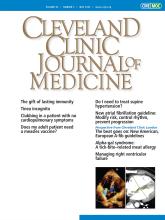Article Figures & Data
Tables
Type of moral distress You are feeling distressed because… Common emotions Trigger phrases MORAL-CONSTRAINT DISTRESS You are constrained from doing what you think is the ethically appropriate action. Angry, frustrated, sense of injustice, powerless “I feel like I’m not doing the right thing.”
“I feel like I am complicit in causing suffering.”MORAL-UNCERTAINTY DISTRESS You are uncertain about whether you are doing the right thing. Torn, conflicted, uncertain, frustrated “I feel torn about what we should do.”
“I don’t know whether this is the right thing to do.”MORAL-DILEMMA DISTRESS You are unable to choose between 2 or more ethically supportable options. Guilt, regret, torn, sense of injustice, sad “I feel like I’m stuck between a rock and a hard place.”
“Both options seem to be equally bad.”MORAL- CONFLICT DISTRESS You are conflicted about the most appropriate ethical action. Conflicted, frustrated, angry, sad “I feel like they don’t understand my point of view.”
“I feel like we have different moral perspectives.”MORAL-TENSION DISTRESS You are unable to share your beliefs with others (this might include your colleagues, manager, or other providers). Sad, angry, frustrated, powerless “I don’t feel like I can talk to anyone about my beliefs.” See and seek moral distress • Look for ethical concerns and signs of moral distress. • Inquire and consider whether an Ethics Consultation is indicated. Understand moral distress • Understand through active listening. • Be receptive to diverse perspectives. • Model a self-reflective process: be aware of your own biases, remember that ethical issues often are not black and white, and avoid responding with correction/rebuke. Pay attention and assess workplace climate • Acknowledge ethical challenges and moral distress. • Assess the unit climate, culture, tone. • Work to mitigate power differentials between caregivers. • Explore and note repeated occurrences and problems. • Assess professional risks of speaking up. Promote a receptive environment and engage team members • Encourage and create spaces for moral dialogue. • Encourage and role-model respectful communication across disciplines. • Promote team-based dialogue and discussion when ethical issues arise. Open opportunities for dialogue • Encourage debriefing. • Ask whether members of the team might benefit from further discussion with an ethics expert: consider whether a Moral Distress Reflective Dialogue or Debrief is indicated. • Utilize resources: bring team members to multidisciplinary meetings, invite bedside nurses to family meetings, and participate in Bioethics rounds. Reflect, evaluate, and revise • Establish self-care as a custom, ask team members how they are doing, and explore whether they need any additional support. Transform negative environments • Acknowledge that the environment is changing, be transparent and ready to answer questions. Developed and adapted from reference 7.
Effective strategies to manage moral distress: consider the need to address the moral event and the distress (psychological/emotional/spiritual) caused by the event. Moral Event and Distress Moral Distress Reflective Dialogues and Debriefs (MDRD) are facilitated by a clinical ethicist and independently licensed social worker or chaplain to provide caregivers with a safe space to reflect on the moral event(s) that cause them to experience distress. During the COVID-19 pandemic, virtual MDRDs are available. Moral Event Targeting the moral event often necessitates a critical examination of the underlying ethical frameworks and consideration of the perspective of others (perspective-taking). The Ethics Consultation Service (ECS) provides support to patients, loved ones, and health care professionals grappling with ethical issues in the provision of patient care. At Cleveland Clinic, the ECS is available 24/7 by paging 22512, placing an EPIC order, or referring to the on-call directory via the intranet. During COVID-19, clinical ethicists in the Center for Bioethics have provided recommendations on a number of issues, including how to decide whether surgery should be considered essential and whether exceptions to the visitation policy are warranted, how to develop ethically robust triage protocols, and how to deal with conflicting ethical values. Clinical ethicists are also available to assist with organizational ethics issues that may cause moral distress, including supporting the development of processes that can be considered fair, equitable, and transparent. Distress Caring for Caregivers is available to support caregivers through life's challenges, providing counseling and Critical Incident Response services. During the COVID-19 pandemic, 30-minute Boost appointments are also available to talk through feelings and provide support. Call Caring for Caregivers at 216.445.6970 for support. Office of Professional Staff Affairs provides confidential services for employees to support psychological distress. We recommend their services for any caregiver who is concerned about stress or Post-Traumatic Stress Disorder. Spiritual Care is available 24/7 for coping with loss, stress, suffering, and more as well as for faith-based concerns. All visits are conducted via phone or FaceTime and are free. Anonymous calls are welcome. Call the Grief and Relief Support Line at 844.204.7433 for support.






